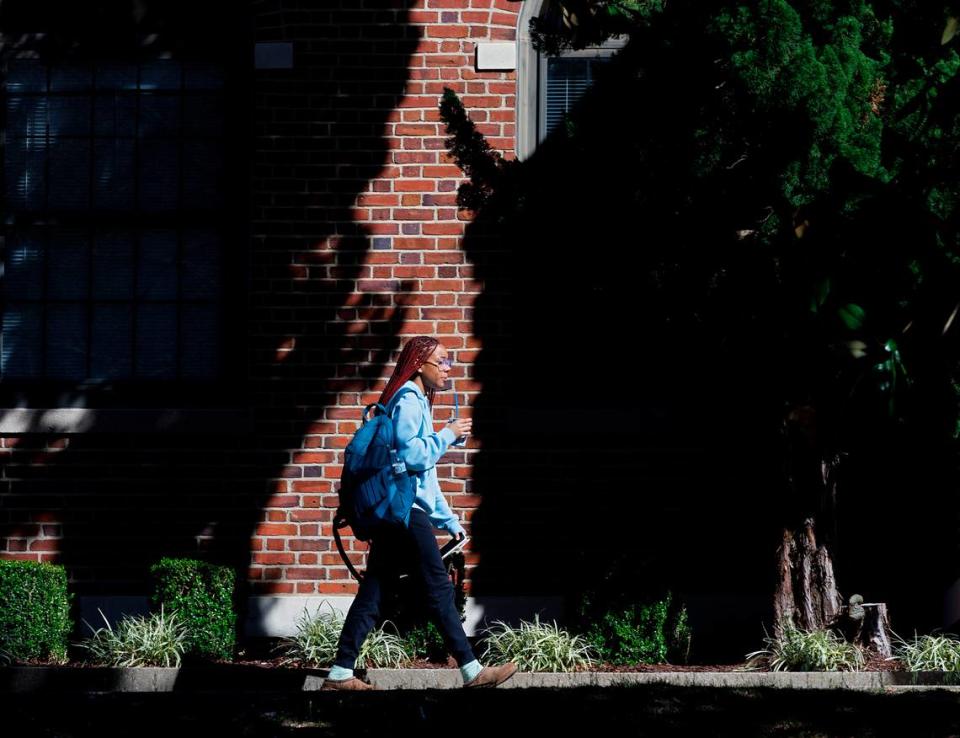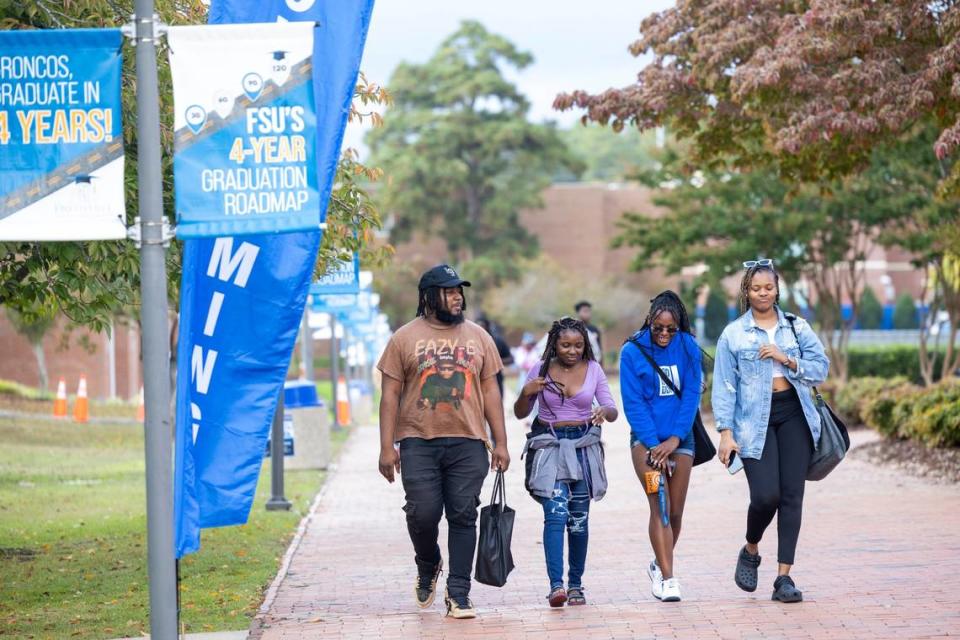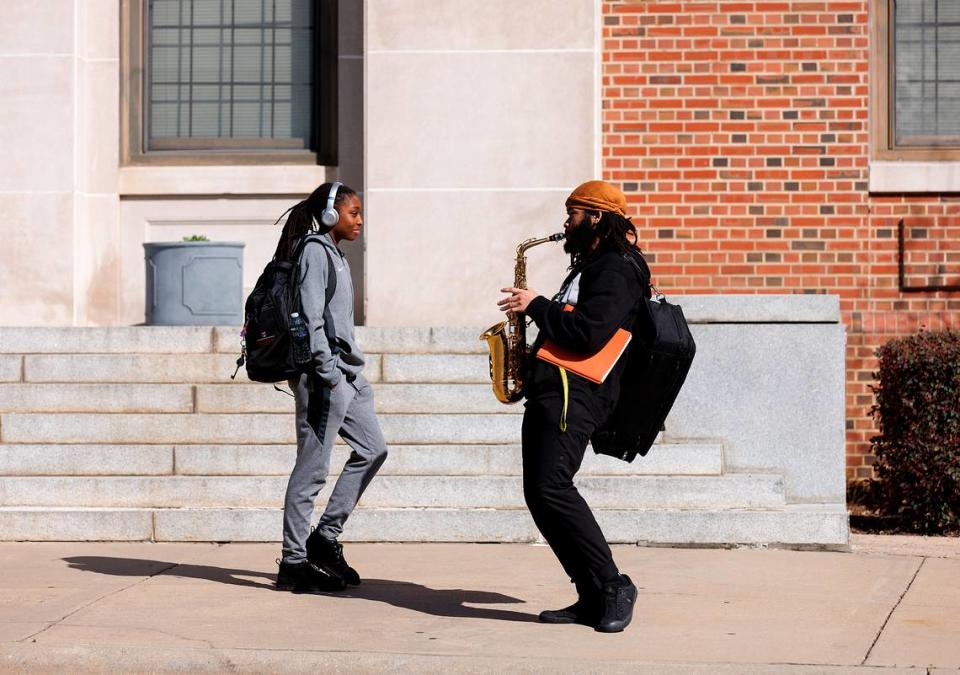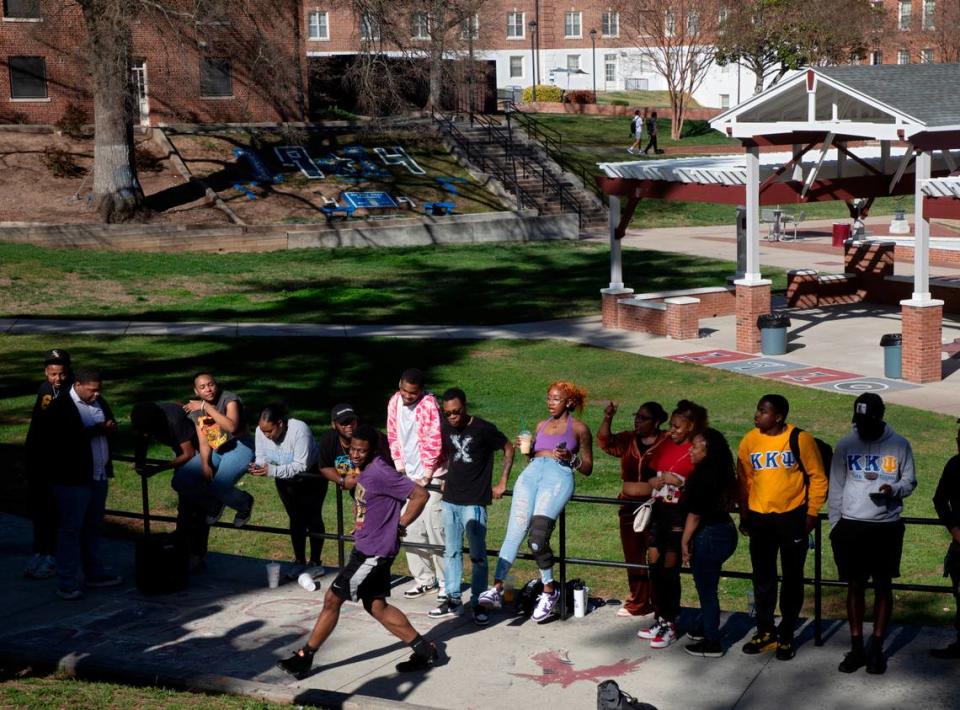More students are applying to NC’s HBCUs. What’s driving the trend?
Several of North Carolina’s historically Black universities are seeing an increase in interest from prospective students this application cycle — the first one since the consideration of race as a factor in college admissions was ruled unconstitutional.
Less than a full year removed from the U.S. Supreme Court’s decision, it’s still too early to gauge the full impact of the ruling, both at HBCUs and other colleges. But the early trend seen in North Carolina aligns with predictions from some college administrators and admissions professionals that the landmark ruling could lead to an influx of applications at HBCUs.
Though there are nuances to such predictions, the underlying reasoning is generally that, with highly selective, predominantly white colleges likely to admit fewer students of color, those students could be more likely to consider schools that place them — and their wellbeing and success — at the forefront of their missions.
“I think the ruling sends a message to people about whether or not they even want to apply, whether or not they feel valued, how they will be treated, more so than was already the case at predominantly white institutions, because issues of belonging, inclusion, equity have always been problematic,” Joy Gaston Gayles, an NC State University professor who researches issues of equity, inclusion and justice in higher education, told The News & Observer.
At least four North Carolina HBCUs have seen increases in applications from prospective undergraduate students this cycle. Another has seen an increase in applications from prospective graduate students.
Admissions professionals at the universities who spoke to The N&O were reluctant to link the increased number of applications at their institutions to the Supreme Court ruling — instead highlighting other factors, such as highly intentional recruitment efforts and unique academic offerings, that are drawing students to apply to the schools.
In some cases, the numbers align with the 9% year-over-year increase in applications — and the 12% increase in applications from underrepresented minority students — reported nationally in January by the Common Application, a membership-based college application platform used by more than 1,000 U.S. colleges.
“I think it’s important that we underscore the fact that I don’t know how — at this moment — how the [Supreme Court’s] decision is impacting us in a positive or negative way right now,” Joseph Montgomery, associate vice provost for enrollment management at NC A&T State University, told The N&O. “We’re evaluating, and we’re in observation of what we see coming through the pipeline, however, it’s too early for us to make a claim that the … decision to remove race in the admissions process has now, all of a sudden, become a catalyst for interest at HBCUs.”

This admissions cycle’s application trends at NC HBCUs
Applications aren’t a flawless method to fully understand students’ interest in a school, nor a school’s appeal to prospective students. Higher education groups, including the national College Board and the College Foundation of North Carolina, generally recommend students apply to at least five or six colleges — of which they can choose only one to attend.
Still, if a student applies to a given college, it can indicate that they have some level of interest in attending the school, should they be admitted.
The N&O asked North Carolina’s five public HBCUs, all part of the UNC System, for the number of applications they have received this application cycle, compared to last cycle, from students who intend to enter the universities as first-year students in the fall.
▪ Elizabeth City State University in late February had received about 500 more applications this cycle, an increase of nearly 9%, compared to the previous year, admissions director Arlinda Halfacre said.
▪ NC A&T in early February had seen a 12% year-over-year increase in applications, Montgomery said. Montgomery declined to share the number of applications the university has received this cycle, citing the university’s plan to continue to take applications from some students until later this spring.
“We’re trending up, but we won’t know more certain until we get to the end,” Montgomery said. “So I think it would be a little difficult to really be specific about what our numbers are, when we’re in motion.”
As the country’s largest HBCU, the university has seen interest and applications increase for at least the past decade, Montgomery said. NC A&T Chancellor Harold Martin said in September that 40,000 prospective students sought admission for the current academic year. More than 13,800 students are enrolled at the university this year.
▪ Fayetteville State University had received about 1,000 more applications this cycle compared to last year, media relations director Devon Smith said, an increase of about 18%.
▪ NC Central University in mid-February had received more than 20,000 applications this cycle from prospective first-year students, nearly 27% more than the previous year, communications and marketing director Quiana Shepard said.
▪ Winston-Salem State University in early March had received about 9,400 applications from prospective first-year students, a decrease of 3% from the previous year, according to information provided by communications and media relations director Kimberly Harrington. But the university had received 376 applications from prospective graduate students, an increase of 41% from last year.
Applications to UNC-Chapel Hill were up 15% in January compared to the previous year, according to interim Chancellor Lee Roberts. Applications to NC State University were up 9% from the previous year.

What’s driving increased application numbers?
NC Central, in Durham, saw the largest percent-increase in applications of any of the five public HBCUs in the state, based on the information the schools provided.
Michael Bailey, NCCU director of undergraduate admissions, said that wasn’t by accident or luck. Instead, he said, it came from “extremely intentional,” data-driven efforts to recruit prospective students and expand the university’s outreach across the state.
The thought behind the targeted approach is to “increase our applicant pool at the top of the funnel” and thus increase enrollment, Bailey said. The university has been identified as one of five in the 16-university UNC System that are “most impacted by changing enrollment patterns,” which can impact the amount of state funding it receives.
Like Montgomery at NC A&T, Bailey said it was these such efforts — not the Supreme Court ruling — that led to the increase in interest from applicants. The university did not consider race in admissions prior to the ruling, anyway. And Bailey said he doesn’t think the decision has, or will, increase the university’s applicant pool, either.
Where Bailey does see a potential impact from the ruling is that predominantly white colleges could “get creative and maybe look at other factors” to maintain diversity on those campuses without the use of race.

Ahead of the decision last June, experts predicted that selective colleges might increase their focus on applicants’ socioeconomic status or geographic location in order to continue assembling diverse student bodies without considering race. Bailey said, for example, the predominately white colleges might increase their recruitment efforts in North Carolina’s most economically distressed counties.
Gayles, the NC State professor, said focusing on such factors could lead to more “competition” in recruitment among HBCUs and predominantly white colleges, but noted it’s too early to understand the full impact.
“I think institutions are still trying to figure out what approaches they might take, if diversity, equity, inclusion is a value that they hold,” Gayles said.
Montgomery said NC A&T is “very intentional about how we talk about the university and who we talk to about our offerings.”
Emphasizing unique programs, offerings
In addition to their recruitment efforts, the universities also highlighted programs geared toward affordability and student success that they say draw students to apply to and attend their respective schools.
Bailey said NC Central makes it clear to students throughout the admissions process that their success upon enrollment is a top priority of the university by highlighting the university’s Eagle Promise program, which emphasizes on-time graduation and career readiness, among other areas.
Two of the universities, Fayetteville State and Elizabeth City State, are part of the NC Promise tuition plan, which offers significantly discounted tuition rates of $1,000 per year for in-state students and $5,000 per year for out-of-state students. Fayetteville State also offers free tuition to military-affiliated students, a program launched two years ago.
Both universities said the NC Promise program, among other offerings, is attractive to prospective students, and rising enrollment trends at each school appear to support such claims.
At Elizabeth City State, where the university is permitted by the UNC System to have a student body with an equal number of in-state and out-of-state students, the program has allowed the university to expand its reach into bordering states.
“We’re going to be more affordable to them, so that’s definitely a draw,” Halfacre, ECSU’s director of admissions, said.
The universities also said they highlight unique academic programs to prospective students, from aviation at ECSU to law at NCCU, the only HBCU in the state with a law school, and others.

Montgomery said NC A&T doesn’t “necessarily lean on the very thing that’s obvious” during its recruitment efforts, instead largely focusing on whether the university is a place for students to thrive.
“The very thing that’s obvious for us is that we are an HBCU,” Montgomery said. “We really, kind of, lean into: What does it mean to be a student at A&T? Because for us, it’s about fit.”
Gayles said students of color will likely weigh their potential success, including their well-being and broader sense of belonging, as crucial factors in their college decisions after the Supreme Court’s ruling.
“All those things matter just as much as going to class and getting good grades, because if you don’t feel like you belong and matter, your likelihood of performing well goes down,” Gayles said. “And HBCUs have always … recruited and made educating minoritized [students] — all people, really — a priority because that’s why they were founded, to provide a place where people could advance their education.”
Halfacre said the message ECSU sends to prospective students is clear — and the other HBCUs offered similar sentiments.
“We want them to come in, find themselves, find what they really want to do,” Halfacre said, “and then just be able to go out and conquer the world.”

